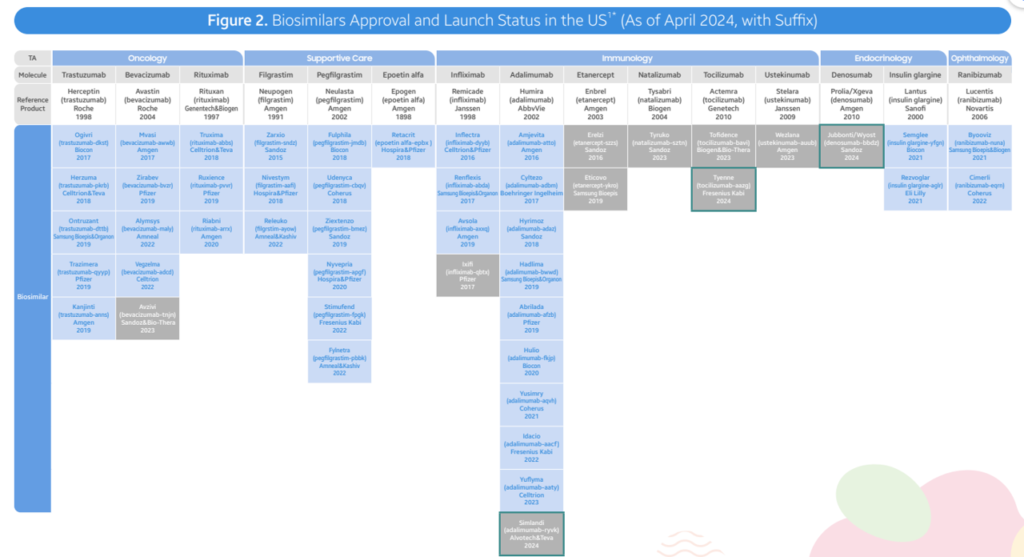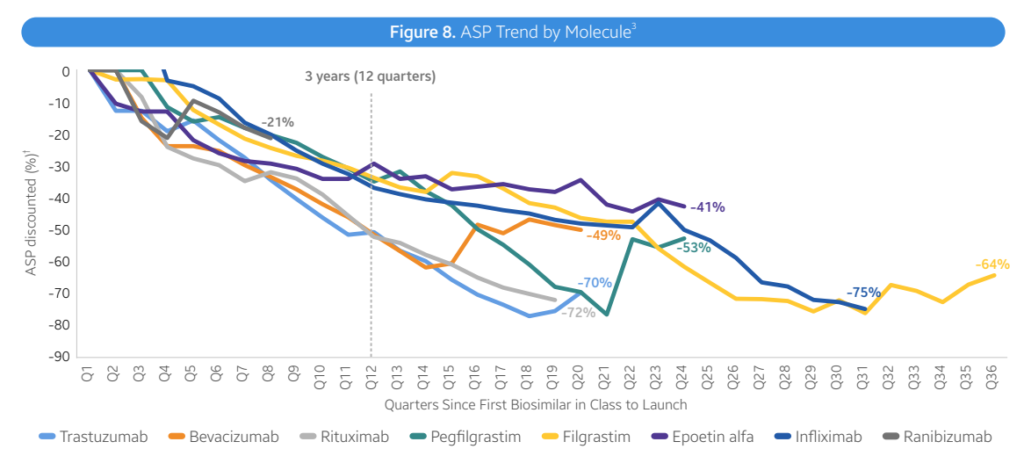Samsung Bioepis has a biosimilar market report for the second quarter of 2024. Some key highlights:
- As of April 2024, the FDA has approved a total of 48 biosimilars containing 15 unique biological molecules. Of the 48 approvals, 38 biosimilars were introduced into the US market. In the second quarter of 2024, three new biosimilars were approved in the US (Simlandi for Humira (adalimumab); Jubbonti/Wyost for Prolia/Xgeva (denosumab); Tyenne for Actemra (tocilizumab)).
- Moderate discounts. Overall, biosimilars result in lower prices, primarily through discounts rather than list prices. However, prices fell by 41% within three years, with large differences between individual therapeutic areas.
- In oncologyThe wholesale cost (WAC) for biosimilars was 10-25% lower than reference products. In supportive care,
- For supportive careBiosimilar WAC prices for pegfilgrastim and epoetin alfa are 20-60% lower than the reference price, but average selling prices (ASP) for the reference products have decreased to match the biosimilar ASP to retain market share.
- Immunology (infliximab). Infliximab biosimilars are being introduced with increasingly lower WACs, ranging from -19% to -59% discount. Biosimilar competition has resulted in ASP prices being 75-90% lower than the reference product, WAC
- Immunology (Humira). Different approaches have been taken for adalimumab biosimilars (Humira). Two biosimilars took advantage of lower WAC prices (85% discount). Most infliximab biosimilars have been launched with progressively lower WACs, ranging from -19% to -59% discounts. Biosimilar competition has resulted in ASP prices being 75-90% lower than the reference product, WAC
- Ophthalmology. Recent launches of ranibizumab (Lucentis) biosimilars have already resulted in 30-40% lower ASP costs for reference products. Six other biosimilars have used an approach with similar WAC pricing to the branded product Humira, but with large discounts that reduce prices by 55-90% of the reference product.
- diabetes. Lantus (insulin glargine) biosimilars have also taken a mixed approach, with some products having a lower WAC and others having a similar WAC but lower prices due to discounts.
- The uptake of biosimilars varies depending on the molecule. Three years postmarketing, biosimilar uptake for bevacizumab, trastuzumab, pegfilgrastm, and rituximab were all >50%. For other drugs such as insulin glargine, epoetin alfa and infliximab, market shares were all below 50% in the third year. In general, market share increases significantly over time, but in immunology, Humira branded products still have a 96% market share.
- Inflation Reduction Act. There are some provisions that are positive for biosimilars, others less so.
- professional: Loss of manufacturer revenue from Medicare drug price negotiations and inflation rebates may result in manufacturers entering the market with higher list prices and/or reducing rebate rates in other therapeutic areas or lines of business (e.g., private insurance). Biosimilars could provide greater cost relief in these future markets. In addition, the increased Medicare payment limit for biosimilars to ASP + 8% helps offset some of the losses that providers may incur when using cheaper ASP biosimilars in terms of medical benefit
- Con: Medicare drug pricing negotiations will place pricing pressure on selected drugs and related competitors. In these markets (e.g., Enbrel, Stelara), the savings that biosimilars can provide to plans may be lower, making the implementation of step therapy through biosimilars less attractive to plan sponsors. Additionally, reductions and caps on Part D cost-sharing requirements for members, while a positive improvement in overall affordability for Medicare beneficiaries, inadvertently reduce the financial incentive for members to switch from an original product to a biosimilar
You can read the entire deck Here.


